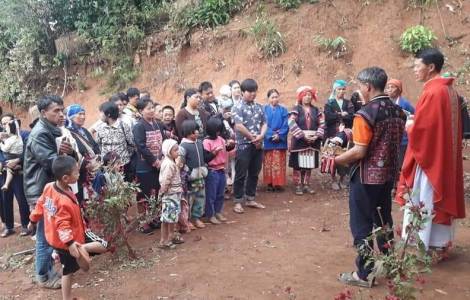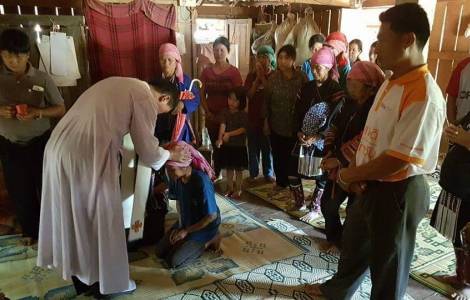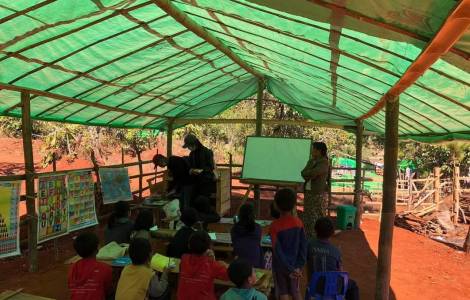
Loikaw (Agenzia Fides) - Two years of civil war, which has gradually intensified, have shaped the face and pastoral approach of priests, consecrated persons, catechists and pastoral workers in many dioceses of Myanmar, especially in the areas most affected by the conflict between the army and the People's Defense Forces rebel groups, which have joined forces with the ethnic militias that have traditionally been active in Myanmar's border areas. The social situation was characterized by the presence of massive flows of internally displaced persons: people forced to leave their homes to find refuge in the forests, far from violence, where they began to struggle to support themselves; or families seeking refuge in makeshift refugee camps - set up as best they can, sometimes by Catholic parishes. In order - in the words of Pope Francis - to "smell like sheep", to be close to people and to share with them the needs and sufferings of daily life, priests, religious and catechists also temporarily leave their churches (for long periods or sometimes permanently) to go to places where the displaced people live under precarious conditions in barracks, huts or tents. A striking example is the Diocese of Loikaw, whose territory extends over the state of Kayah (eastern Myanmar), where the civil war is ongoing. Here even Bishop Celso Ba Shwe was expelled from the cathedral, which was first attacked and then occupied by the Burmese army, which made it their base camp (see Fides, 19/12/2023). As confirmed to Fides, the Bishop lived a “Christmas among refugees”, traveling to the different areas and parishes of the diocese, celebrating the sacraments, visiting refugee camps, blessing and consoling families tormented by war and misery. "The Lord has given me a period of forced travel," says the Bishop. "Despite the pain of having to leave the cathedral, all the goods and documents of our local Church - we do not know what we will find when all this is over - I welcome this grace with an open heart. The Lord allows me to meet so many people, to be closer to people than ever before, to listen and to comfort." "I live in absolute uncertainty myself, but it is a gift that I am able to meet brothers and sisters, priests and people every day. It is an experience of deep trust in the providence of God, which takes care of me and all of us. It's a special time of closeness and love for God and fellow human beings," he says and tells how he celebrated Christmas in a wooden chapel in the middle of the forest.
The Bishop is not alone: priests of the diocese also often take difficult paths and travel through very dangerous areas where fighting continues. But we are aware that "in times of fear and uncertainty, people need our presence and encouragement," explains Father Paul, one of the priests of the Loikaw diocese, describing the situation: "In the area of a single parish there are more than 20 camps for internally displaced persons. Of the 35 parishes in the diocese, more than half are deserted because the priests and religious sisters have fled with the faithful to camps in the jungle. Sunday mass is celebrated outdoors or in simple wooden chapels built by the faithful. The people are frightened and traumatized". Priests, religious, catechists, pastoral and Caritas workers "walk on a knife's edge because if they provide spiritual assistance and humanitarian assistance to refugees, they may be falsely accused by the military of supporting the resistance and thus be arrested and taken to prison " explains the priest. Since the beginning of the conflict, the church in Loikaw has been involved in humanitarian work, even under precarious conditions: when the front line of fighting changes, the displaced people often have to move. Under these circumstances, infrastructure for shelter, water supply, food and trying to organize schools are a constant challenge. Thanks in part to foreign aid, the local church has organized mobile clinics, emergency aid plans and educational programs for children, young people and adolescents who have not been going to school regularly for almost two years, always with the aim of “supporting the people”. "We hope and pray that the people of this country can once again live in peace, in human dignity and in true freedom. We pray every day for the restoration of peace and justice in the country, for the reconciliation and conversion of our people," affirms Bishop Celso Ba Shwe. Meanwhile, the news of the last few days confirms the violence against the civilian popualtion: The Burmese army killed seventeen civilians, including children, and wounded more than thirty people in an airstrike on January 7 in the west of the country. The attack took place during a church service in the town of Kanan between Khampat and Boukkan in Tamu district, part of the Catholic diocese of Kalay. More than ten houses, a school and a Christian church were destroyed in the attack. As a result of such attacks, the number of internally displaced people, all civilians, especially the elderly, women and children, continues to rise and has exceeded 2.5 million across the country. (PA) (Agenzia Fides, 10/1/2024)


 AFRICA/NIGERIA - Member of the Missionary Society of the Holy Spirit kidnapped in south-east Nigeria
AFRICA/NIGERIA - Member of the Missionary Society of the Holy Spirit kidnapped in south-east Nigeria